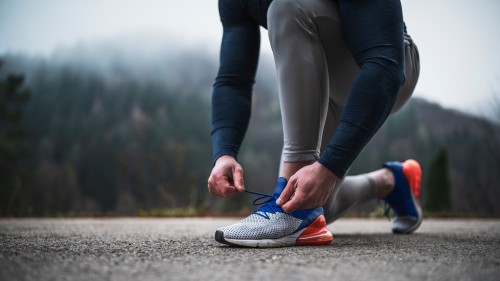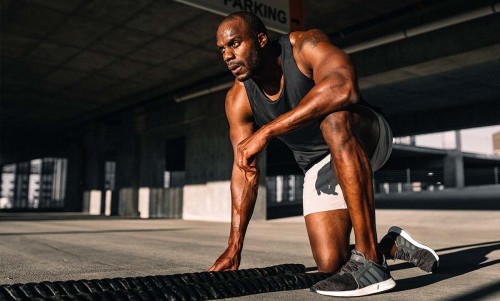What to Eat Before and After a Workout, According to a Dietitian
Published on September 15, 2021
Medically Reviewed by Anthony Dugarte, MD
Want to optimize your workout and are curious about what to eat before to improve your performance? While pre-workout nutrition should be personalized to the athlete, here is some advice on how to figure out what is best for your pre-workout fuel.


Good nutrition is part of fine-tuning the perfect workout.
Starting your exercise routine with a well-nourished body can improve the performance of both muscles and mind and can help speed recovery afterward.
Whether you’re trying to improve fitness or training for a marathon, here’s what to consider to help make the most of your hard work.
Consider Your Exercise Intensity and Goals
People have a wide range of nutritional needs. When it comes to pre-exercise requirements, the intensity of your workout routine can further vary those needs.
For example, someone going for a two-mile nature stroll will need far fewer calories than someone training for a triathlon.
And someone taking a cardio class for weight loss is going to need less protein than someone trying to build muscle with resistance training.
If you’re not sure about the intensity of your workout, investing in a wearable exercise tracker with a heart rate monitor may be beneficial.
These devices can give you a general idea of how many calories you’re burning.
A registered dietitian can then help you use the information to tailor your pre-workout meals so that you meet your goals and avoid unwanted weight gain from adding too many calories.
Make Hydration Your First Priority
Without realizing it, many of us are dehydrated even before our workouts begin. (1)
Not everyone has a strong sense of thirst, so a better way to gauge hydration is by noticing the color of your urine. (2)
A pale yellow color is good, while darker yellow indicates that you need more water. On the other extreme, clear urine can indicate over-hydration, which also isn’t ideal.
Dehydration can cause:
- Fatigue
- Lower ability to exercise
- Changes in heart rate
- Dizziness
- Reductions in the ability to think well
- Irritability
How much do you need? The baseline RDA for water is 11 cups (88 oz) for women and 15 cups (120 oz) for men, but more is needed if you’re exercising and sweating heavily. (3)
This may seem like a lot of water, but the numbers include all fluids like milk, juice, coffee, tea, high liquid foods like soup, and water-rich fruits like melon.
While fluid needs vary greatly based on how heavy your exercise routine will be, the Academy of Nutrition and Dietetics has general guidelines for pre-exercise hydration summarized in the table below. (4)
The table also includes guidelines for staying hydrated during and after your workout so that you’ll be ready for exercise the following day.
| Recommendation | Example | |
| Before Exercise | Drink 5–10 mL/kg weight 2–4 hours before exercise | An 82 kg person would drink 410–820 mL or 14–28 oz fluid |
| During Vigorous Exercise | 14–27 oz of water or sports drinks per hour depending on sweat loss | 5 oz every 20 minutes when sweating lightly |
| After Exercise* | 18–24 oz of water or sports drinks for every pound of weight lost | If athlete loses 2 lbs then 2 lbs x 18 oz = 36 oz |
* It’s beneficial to check your weight before and after workouts. If weight is gained after a heavy exercise day, it’s a signal that you drank too much.
Water is the best choice during exercise if you’re working out for less than an hour.
If you work out longer than one hour, sports drinks are an easy way to replace lost electrolytes and carbohydrates.
Summary
Remember that dehydration can be detrimental to your workout. Be sure to drink plenty of water before you begin to exercise.
Related: 8 Health Benefits of Drinking Enough Water
Include Carbohydrates and Protein in Your Pre-Workout Meal
Carbohydrates and protein are important macronutrients to think about when fueling up for exercise.
Carbohydrates provide the energy you’ll need to perform your best, and protein is important for the repair and recovery of your muscles.
There are countless studies that have tried to pinpoint the exact amount of carbohydrate and protein that is best for people before exercise, and the results have varied greatly.
Because of the difference in study results, recommendations from professional sports entities tend to fluctuate and should only be seen as guidelines.
Carbohydrates
When it comes to performance, most experts agree that carbohydrates are key. We store carbohydrates in our muscles and liver in a form called glycogen. (5, 6)
By building your glycogen stores before a heavy workout, you’ll fuel your muscles, give yourself the energy to exercise harder, and prevent low blood sugar symptoms like blurred vision and indecisiveness.
On the heaviest of workout days like those with long endurance runs or high-intensity interval training, large amounts of carbohydrates are recommended.
Around 3–4 hours prior to your event, it’s recommended to get 3–4 g/kg of carbohydrates. For a 150 lb or 68 kg person, this is 204–272 grams of carbohydrate.
Some examples of high-carbohydrate foods are:
- 2 large shredded wheat biscuits in 8 oz milk: 53 g
- 1 large baked potato: 63 g
- 1 large banana: 31 g
- 1/3 cup dried cherries: 32 g
- 8 oz orange juice: 28 g
- 20 oz sports drink: 36 g
Lighter workout days take far fewer carbohydrates.
30 grams of easily digestible carbohydrates just before your workout may be all you need to perform well. This could be as easy as a cup of oatmeal topped with fresh berries.
Summary
Carbohydrates may be the most important component to mental and physical workout performance. Adequate glycogen stores can help you get the most out of your workout.
Protein
If your goal is to gain or maintain muscle during your workouts, getting enough high-quality protein in your diet is important.
The popular belief for years was that there was only a small window of time to eat protein for recovery after a workout. Now, experts are not so certain about the best timing. (7)
The current recommendation is to spread your protein needs throughout the day, with about 20–30 grams at each meal or snack, including your pre-workout meal.
That way, digested protein amino acids, the molecules you’ll need to make muscle, are already circulating in your body and ready to be used for repairs.
Examples of 20–30 grams of high-quality protein include:
- 1 cup of cottage cheese
- 6 oz of Greek yogurt and 1 egg
- Turkey breast (3 oz) sandwich
- Peanut butter (3 tbsp) sandwich with 8 oz soy beverage
- Tuna fish (3 oz) sandwich
A study in 2007 showed that athletes who ate 20 grams of protein before a workout and 20 grams after had higher muscle gain than those who didn’t consume protein in that window of time. (8)
The amount of protein we need daily is controversial. While the current RDA recommendation is .08 g/kg body weight, some experts believe we need more. (9)
Here is some guidance based on information from a sports nutritionist reference guide.
| Recommendation | Example | |
| Average Person, Light Exercise | 0.9 g protein/kg per day | 80 kg athlete x 0.9 g = 72 g of protein per day |
| Average Person Over Age 50 | 1.2 g protein/kg per day | 80 kg athlete x 1.2 g = 96 g of protein per day |
| Endurance Athlete (playing a sport for several hours daily) | 1.2–1.7 g protein/kg per day | 80 kg athlete x 1.2 g = 96 g of protein per day |
| Resistance Exercise Workout Days | 1.6–1.7 g or more protein/kg per day | 80 kg athlete x 1.6 g = 128 g of protein per day |
Resource: Karpinski, Christine. Sports Nutrition: A Handbook for Professionals. 2017. Print.
Higher quality proteins are those which have all 9 essential amino acids (EAA), the building blocks of protein.
Some examples of these sources are fish, eggs, dairy, meat, poultry, tofu, quinoa, and the popular vegan staple nutritional yeast.
We need all of the EAAs to make muscle, but some EAAs have been shown to reduce fatigue, reduce muscle soreness, and increase muscle synthesis when consumed as part of the pre-workout meal. (10)
You may have heard of leucine, isoleucine, and valine, which are branched-chain amino acids (BCAAs).
Leucine seems to be especially important and even seems to reduce muscle wasting in older adults. (11)
Some great BCAA sources include meat, dairy, salmon, tuna, eggs, poultry, beans, seeds, dried peas, cashews, pine nuts, and pistachios.
Dairy products, especially ricotta cheese and Greek yogurt, are good sources of whey protein, which is high in BCAAs.
Summary
Adequate protein is important for building and maintaining muscle. It’s best to have some protein before your workouts so that recovery can begin quickly.
Timing Your Meals: Balancing Fuel Needs and Digestive Comfort
Timing meals can be tricky on heavier workout days. Some people don’t feel like eating right before exercise, but being low on fuel and nutrients can impact your overall performance.
In general, the closer you get to go-time, the lighter and more easily digestible you’ll want your meal to be. As mentioned above, you’ll want to include carbohydrates and protein in your choices.
Choosing one of the meals and timing suggestions in the chart below may help as you experiment with what works best for you.
| Size and Calories | Recommended Timing | Morning Meal Idea |
| Larger meal: 450–1000 kcals | Finish meal 3–4 hours prior. Ex: Start time 10 am, eat by 7 am. | 3/4 cup rolled oats cooked in milk, mixed with walnuts and dried tart cherries; 2 boiled eggs; orange juice; 1 large banana |
| Medium meal: 250–450 kcals | Finish breakfast 1.5–3 hours prior. Ex: Start time 10 am, eat by 8:30 am. | 1 English muffin with jam and peanut butter, 6oz plain Greek yogurt, 1/2 cup blueberries, 1 boiled egg |
| Small meal/snack: 120–250 kcals | Finish breakfast 30min–1.5 hours prior. Ex: Start time 7 am, eat by 6:30 am. | 1/2 cup grits cooked in milk, 1 medium banana |
Fueling up with a high carbohydrate, easily digestible meal the night before a morning workout is especially important if an early start won’t allow time to digest a larger breakfast meal.
If you want to take your workout benefits to the next level, try tracking your meals in an exercise journal to see what works best for you.
Summary
The closer you get to your workout time, the more important it is to make sure your food is easily digestible and carbohydrate-rich.
What Not to Eat Before a Workout
Some foods can lead to heartburn or stomach discomfort during heavy exercise. Everyone tolerates food differently, but most people find right before a workout it’s better to avoid:
- High-fat foods, like those that are deep-fried
- High-fiber foods, like vegetables
- Spicy foods
- Alcoholic beverages
- Carbonated drinks
- Gas-producing foods, like beans
- Foods that contain artificial sweeteners
- Foods that are new to you, including processed breakfast or energy bars
- Too much caffeine, including energy drinks
Summary
While fueling is important, choose your foods with caution to avoid stomach upset during your workouts.
Make It Personal
Consider that the information provided here are guidelines based on nutrition science, which is a work in progress.
People are individuals, which means that no two people are going to have the exact same nutrient needs.
The pre-workout foods that work best for you as an individual should be based on your own trial and error.
The best time to figure out what works for you is during daily exercise, not on the day of your 15k or tournament.
For best results, keep a food log, and track how you feel and how you perform.
Post-Workout Recovery Meals
After a workout, it’s time to think about foods that will help you recover the nutrients you’ve lost during exercise.
This includes eating carbohydrates to rebuild the glycogen stores you used up during your workout.
You’ll also need to include more protein to repair and build muscles.
If you’re planning strenuous exercise again within 8 hours after a glycogen-depleting workout, it’s important to replenish your carbohydrate stores as soon as possible. (12)
The recommendation is 1–1.2 grams of carbohydrate per kilogram of body weight for the first 4 hours after your initial workout.
However, if you have a longer amount of time to recover, replacing glycogen should be left to the athlete’s preference.
Studies show that eating protein is most useful in the first few hours after exercise, so it’s best to eat a high-protein snack within the first hour after your workout. (13)
However, if there are amino acid building blocks available, some recovery will still take place for at least 24 hours. (14)
To gain the most benefit from your exercise, it’s recommended that athletes spread their protein intake throughout the day in 20–30 gram portions.
Some recovery meal and snack ideas include:
- Smoothies made with peanut butter, fruit, and milk
- Eggs scrambled with vegetables and a glass of juice
- Almond butter and banana sandwich on whole wheat
- Baked lasagna with ricotta cheese
Summary
Post-workout meals have a higher emphasis on protein for better muscle building and recovery.
The Bottom Line
A well-planned pre-exercise meal can help you make the most of your workout routine by nourishing your brain and your body.
Proper hydration, building your glycogen stores with sufficient carbohydrates, and making sure you have plenty of protein for recovery and muscle building are all important components.
Keep in mind that everyone’s body is different and finding the perfect combination is a matter of trial and error.
There are some foods that may not be appropriate before a workout because they may cause gastrointestinal upset.
If you need more help fine-tuning your pre-workout meals so that your food can help you reach your fitness goals, find a registered dietitian in your area.
At WellnessVerge, we only use reputable sources, including peer-reviewed medical journals and well-respected academic institutions.
- Fluid consumption, exercise, and cognitive performance:
https://www.ncbi.nlm.nih.gov/pmc/articles/PMC4993146/ - Heat Stress: Hydration:
https://www.cdc.gov/niosh/mining/UserFiles/works/pdfs/2017-126.pdf - Dietary Reference Intakes (DRIs): Recommended Dietary Allowances and Adequate Intakes, Total Water and Macronutrients:
https://www.ncbi.nlm.nih.gov/books/NBK56068/table/summarytables.t4/?report=objectonly - Position of the Academy of Nutrition and Dietetics, Dietitians of Canada, and the American College of Sports Medicine: Nutrition and Athletic Performance:
https://jandonline.org/article/S2212-2672(15)01802-X/fulltext - Carbohydrate Availability and Physical Performance: Physiological Overview and Practical Recommendations:
https://www.ncbi.nlm.nih.gov/pmc/articles/PMC6566225/ - Carbohydrates and Blood Sugar:
https://www.hsph.harvard.edu/nutritionsource/carbohydrates/carbohydrates-and-blood-sugar/ - Timing and distribution of protein ingestion during prolonged recovery from resistance exercise alters myofibrillar protein synthesis:
https://www.ncbi.nlm.nih.gov/pmc/articles/PMC3650697/ - Effects of resistance training and protein plus amino acid supplementation on muscle anabolism, mass, and strength:
https://pubmed.ncbi.nlm.nih.gov/16988909/ - Harvard Health Blog: How much protein do you need every day?:
https://www.health.harvard.edu/blog/how-much-protein-do-you-need-every-day-201506188096 - Effect of BCAA intake during endurance exercises on fatigue substances, muscle damage substances, and energy metabolism substances:
https://www.ncbi.nlm.nih.gov/pmc/articles/PMC4241904/ - The Effects of Leucine-Enriched Branched-Chain Amino Acid Supplementation on Recovery After High-Intensity Resistance Exercise:
https://pubmed.ncbi.nlm.nih.gov/31172828/ - Carbohydrates for training and competition:
https://www.tandfonline.com/doi/full/10.1080/02640414.2011.585473 - Leucine-enriched essential amino acid and carbohydrate ingestion following resistance exercise enhances mTOR signaling and protein synthesis in human muscle:
https://pubmed.ncbi.nlm.nih.gov/18056791/ - Enhanced Amino Acid Sensitivity of Myofibrillar Protein Synthesis Persists for up to 24 h after Resistance Exercise in Young Men:
https://academic.oup.com/jn/article/141/4/568/4630587






